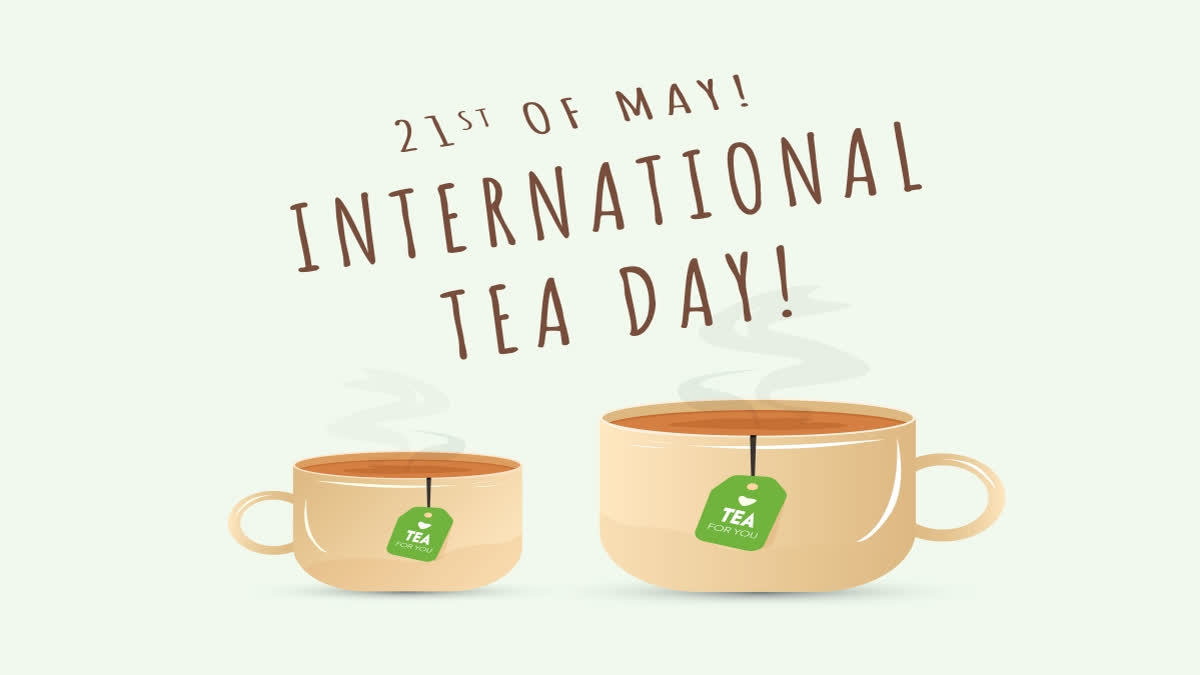Hyderabad: International Tea Day is celebrated annually on May 21. It is a day to celebrate the long history, cultural significance and economic importance of tea around the world.
The International Tea Day campaign was launched in 2005 by the trade unions, small tea growers and civil society organisations in Asia and Africa to address the issues of living wages for workers and fair prices for small tea producers. The United State established International Tea Day in 2019.
This year, International Tea Day highlights women and their role in the tea sector. It is also an opportunity to celebrate the cultural heritage, health benefits and economic importance of tea, while working to make its production sustainable "from field to cup" ensuring its benefits for people, cultures and the environment continue for generations.
From the rich, earthy flavors of China's traditional Pu'er teas to the milky sweetness of India's chai, tea is not only a delicious beverage but also a reflection of the history and traditions of each country.
Origin of Tea:
It is believed that tea originated in northeast India, north Myanmar and southwest China, but the exact place where the plant first grew is not known. Tea has been with us for a long time. There is evidence that tea was consumed in China 5,000 years ago.
Also there is another story of Tea origin. The story of tea begins in China. According to legend, in 2737 BC, the Chinese emperor Shen Nung was sitting beneath a tree while his servant boiled drinking water, when some leaves from the tree blew into the water. Shen Nung, a renowned herbalist, decided to try the infusion that his servant had accidentally created.
India is the world's largest tea-drinking nation, although the per capita consumption of tea remains a modest 750 grams (26 oz) per person every year. Turkey, with 2.5 kilograms (5 lb 8 oz) of tea consumed per person per year, is the world's greatest per capita consumer.
Tea offers numerous health benefits
It is a relaxing drink that helps increase our attention and focus, is heart-friendly, good for the gut and may help manage blood sugar. Numerous studies have shown that a variety of teas may boost your immune system, fight off inflammation, and even ward off cancer and heart disease.
- Tea contains antioxidants
- Tea contains less caffeine than coffee
- Tea may reduce your risk of heart attack and stroke
- Tea may help with weight loss
- Tea may help protect your bones
- Tea may keep your smile bright
- Tea may boost the immune system
- Tea may help battle cancer
- Herbal tea may soothe the digestive system
- Pure tea is calorie free
Why tea is so famous in the world?
Tea is the world’s most consumed drink, after water
It comes in a wide range of flavourings and leaf types, so there’s something for everyone – fruity tropical, earthy black, oolong – there's a tea to suit every taste. It's older than coffee by several thousand years, so it had more time to be passed down from generation to generation.
Tea and Economy:
Tea is one of the most important cash crops and plays a significant role in rural development, poverty reduction and food security in exporting and developing countries. It is a principle source of livelihood for millions of smallholder producers.
The tea industry is a main source of income and export revenues for some of the poorest countries and, as a labour-intensive sector, provides jobs, especially in remote and economically disadvantaged areas. Tea can play a significant role in rural development, poverty reduction and food security in developing countries, being one of the most important cash crops.
Tea and climate change:
Tea production is highly sensitive to changes in growing conditions. Tea can only be produced in narrowly defined agro-ecological conditions and, hence, in a very limited number of countries, many of which will be heavily impacted by climate change. Changes in temperature and rainfall patterns, with more floods and droughts, are already affecting yields, tea product quality and prices, lowering incomes and threatening rural livelihoods.
10 Healthy Herbal Teas You Should Try:
- Chamomile tea
- Peppermint tea
- Ginger tea
- Hibiscus tea
- Echinacea tea
- Rooibos tea
- Sage tea
- Lemon balm tea
- Rose hip tea
- Passionflower tea
Unknown Facts About Tea In India:
The British East India Company’s feet were locked in India. They noticed the Assamese Singpho tribe sipping something that tasted and smelled like tea. Only after this did the company establish the very first English Tea Garden in the Chauba district of Assam in 1837, and cultivation in India began. During this period, the company also began manufacturing tea in Sri Lanka. Tea growing is already flourishing in around 52 nations outside of its native China.
It produces 1,700,000 tonnes a year approximately, which is almost 35 per cent of what was produced worldwide. India comes second in the list as it produces an average of 900,094 tonnes per year. India is a nation of over one billion tea drinkers – 70 per cent of the tea produced in the country is consumed within the country itself.
Darjeeling Tea is world renowned for its flavour, which is unequaled by other tea producing areas not only of India but also of the world. Darjeeling still manufactures the tea by the original methods known as the 'orthodox' method.
Tea Producing Countries in the World
- China is the top producer of tea in the world
- Tea is a part of daily life in India, thus making it the second-largest tea-producing country
- Kenya produces 305 million tonnes of tea every year
- Sri Lanka produces 300 million tonnes of tea every year
- Turkey produces 175 million tonnes of tea every year



